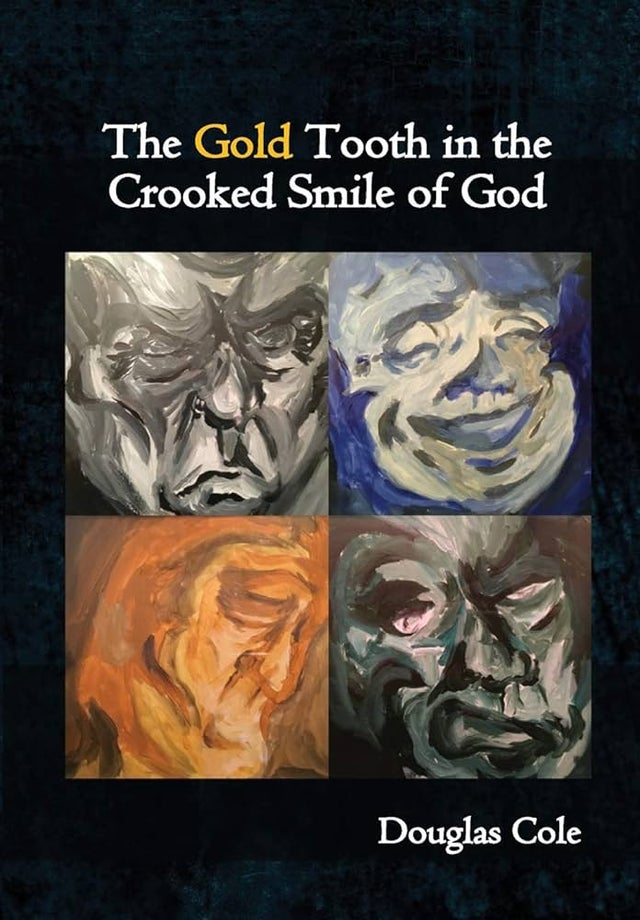- Poetry
- >
- The Gold Tooth in the Crooked Smile of God by Douglas Cole
The Gold Tooth in the Crooked Smile of God by Douglas Cole
SKU:
$16.00
16
28
$16.00 - $28.00
Unavailable
per item
“There's some kind of magic going on in Douglas Cole's The Gold Tooth in the Crooked Smile of God,” writes Jim Daniels.
From “The Consolation of Philosophy:” “There is a great ledger book behind things/in which you will find recorded all/your joy and success,/sickness, failure, pleasure and suffering/over the arc of several life-times/(because one is never enough),/as every soul is delivered in exact proportion/the same amount of comedy and tragedy.”
Details
Title: The Gold Tooth in the Crooked Smile of God
Author: Douglas Cole
Genre: Poetry
List Price: $27.99 (hardback)
ISBN: 978-1-947021-27-3
Publication Date: October 30, 2018
Version Availability
Hardcovers and paperback editions are available.
A Reading from Douglas Cole
Advanced Praise
“These are poems of the street, and their gritty observations remind us what it means to be alive—to struggle, to dream, to survive.”
—Jake Young, former editor of Chicago Quarterly Review
“Douglas Cole’s gritty, gut-wrenching and image-rich poetry will haunt you long after reading his work. “
—Dan Sicoli, Co-Editor of Slipstream and author of Pagan Supper and The Allegories
“The lovelorn, the haunted, and the neglected are lifted from their place in the margins and given the spotlight, front and center. These well-wrought poems make the commonplace special, and celebrate the forgotten with dignity and warmth.”
—John Skoyles, Editor Ploughshares, and author The Nut File and A Moveable Famine
“There's some kind of magic going on in Douglas Cole's The Gold Tooth in the Crooked Smile of God—he casts an entrancing spell with the long sinuous unfolding of these exquisite poems. Wry, wistful, poignant and humble, these winding poems create surprising streams that I am grateful to be carried down.”
—Jim Daniels, poet, screenwriter, author of Street Caligraphy and The Middle Ages
Let us “climb out of this world” and into the “crooked smile of God” seeking that one gold tooth of beauty in the everyday existence of the living and the dead. It is between “the broken rafters vanishing in true moonlight” that Douglas Cole, in his fourth book of poetry, The Gold Tooth in the Crooked Smile of God, takes readers on a journey into the dark and cavernous depths of human experience, emotion, and the nebulous relationship of the interstitial; into the open mouth of memory. Cole’s narrators prepare us for this voyage and tell us to be ready “when beauty pulls a curtain back” exposing the truths of people and the various dimensions of living each one of us must pass through; it is Cole’s narrator that suggests that we “look at this as a series of broad strokes” in this boundary-less collection of poems, characters, circumstances - as a synesthetic composition of jazz.
As readers, we will become ghosts. We will become voyeurs in the grey of blended time and question the realities of grief, hardship, hope. Cole’s work draws us into the brightness of recollection in his lines “like a newsreel in an empty theater” and “talking to yourself in a store window,/and the iris narrowing to a black/pupil in the eye is blossoming/white lightning coming your way…” Be ready for the waiting, the surprise of a note outside of the ordinary, that we pass through as apparition, Cole’s lines suggest, “we rush through limbos – why be in a hurry for sorrow?”
“…but we make it through” and with the resilience of the multi racial poetess, Ai, the meter of Beckett as jazz musician and the gold possibilities of Ionesco, “we will return again/ from deep space dreams,/ young and old and amazed.”
Working together, the poems in The Gold Tooth in the Crooked Smile of God create a full picture of a weather system of the downtrodden that reads as both portrait and elegy. These poems are not out to change the world, but to record with precision the movements and moods of people finding their way between sunlight and storm.
-- Matt Daly
alone dead, but alive and well, roiling to the themes of celebration and austerity, music and silence, memory and oblivion, and ghosts of the past and present encountering the daemons of the now. With language both visceral and assonant (old men "hunker"; I "hocked" a pair of family daggers), the speaker is as committed, in turns bacchanalian and reverential, to an aesthetic of the "party in motion" as he is, to the "vast vault memory of God." Sans punctuation, these carefully lineated stanzas capture, in forms of finitude and grandeur (e.g. "LA Days," "Time of the Greats," and "Bryan") the kind of dizzying, epiphanic realizations last known to us in Ginsberg's "Howl." Are we moral agents, or characters? Is music designed to wake or lull us into dream? If we wait for beauty, will it eventually appear -- or return? How will our generation be remembered, or defined?
Out Homer-ing Homer, this speaker's exploratory aims are not to the ends of the earth and sea, but to infinity and back, before he finally lands upon a more terrestrial equation: can the long-dead self be resurrected? Despite the broken clocks, dancing, and endless flow of Mai Tais at Lethean tiki bars, one suspects that the answer is not only yes, but hell yes: befitting to a god whose one tooth gleams gold, like a rapper or prodigal son.
-- Virginia Konchan
